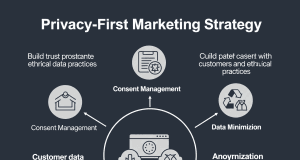As data privacy becomes increasingly critical in our digital world, the California Consumer Privacy Act (CCPA) has emerged as a significant regulation shaping how businesses handle consumer information. Enforced since January 1, 2020, the CCPA grants California residents greater control over their personal data, necessitating that businesses adopt rigorous compliance measures. To navigate this complex landscape, organizations can leverage various tools designed to simplify compliance efforts. Here’s an overview of some of the best CCPA tools available to ensure your business meets regulatory requirements.
Understanding CCPA Compliance
Before diving into compliance tools, it’s essential to understand the key requirements of the CCPA:
Consumer Rights: California residents have the right to know what personal information is collected about them, the purpose of the collection, and the ability to request deletion of their data.
Business Obligations: Companies must inform consumers of their data practices, provide opt-out options for data selling, and maintain strict security protocols.
- Penalties for Non-Compliance: Organizations that fail to comply can face substantial fines, making the adoption of compliance tools crucial.
The Best CCPA Compliance Tools
1. OneTrust
OneTrust is a leading privacy management platform offering a comprehensive suite of tools for CCPA compliance.
Key Features:
- Data Mapping and Inventory: Easily identify what personal data you hold and how it flows through your organization.
- Consumer Request Management: Streamlined processes for managing consumer requests related to CCPA rights.
- Policy Management: Tools to create and update privacy notices in accordance with the CCPA.
2. TrustArc
TrustArc provides a robust platform for privacy compliance, offering solutions tailored for CCPA.
Key Features:
- Assessment Tools: Conduct thorough privacy assessments to ensure compliance.
- Consumer Rights Automation: Automate responses to consumer requests efficiently and accurately.
- Reporting and Analytics: Detailed insights to track compliance efforts and consumer engagement.
3. BigID
BigID focuses on data discovery and intelligence, essential for CCPA compliance.
Key Features:
- Data Discovery: Automated tools to identify and categorize sensitive personal data across your organization.
- Data Rights Management: Tools to honor consumer requests regarding their personal data.
- Privacy Insights: Analytics that help organizations understand their data landscape better.
4. GDPR365
GDPR365 is designed with privacy compliance in mind, benefiting those dealing with both GDPR and CCPA regulations.
Key Features:
- Customizable Workflows: Tailor processes to meet organizational needs for compliance.
- User-Friendly Interface: Simplifies compliance tasks with an intuitive design.
- Training Modules: Provides educational resources for your team on privacy regulations.
5. IAPP Resource Center
The International Association of Privacy Professionals (IAPP) offers a wide range of resources that can aid companies in their CCPA compliance journey.
Key Features:
- Training: Professional development and training sessions on privacy laws and compliance.
- Guidance Documents: Access to best practices and templates essential for CCPA.
- Networking Opportunities: Connect with industry experts and peers to share insights and solutions.
Conclusion
CCPA compliance is not just a legal obligation; it’s a critical factor in building consumer trust. By utilizing the right tools, businesses can effectively manage consumer data, respond to requests promptly, and meet all regulatory requirements. Organizations should assess their needs and consider integrating one or more of the tools mentioned above into their compliance strategies, ensuring they remain ahead of the curve in data privacy management. Being proactive not only mitigates the risk of fines but also positions your organization as a trusted steward of consumer data.









